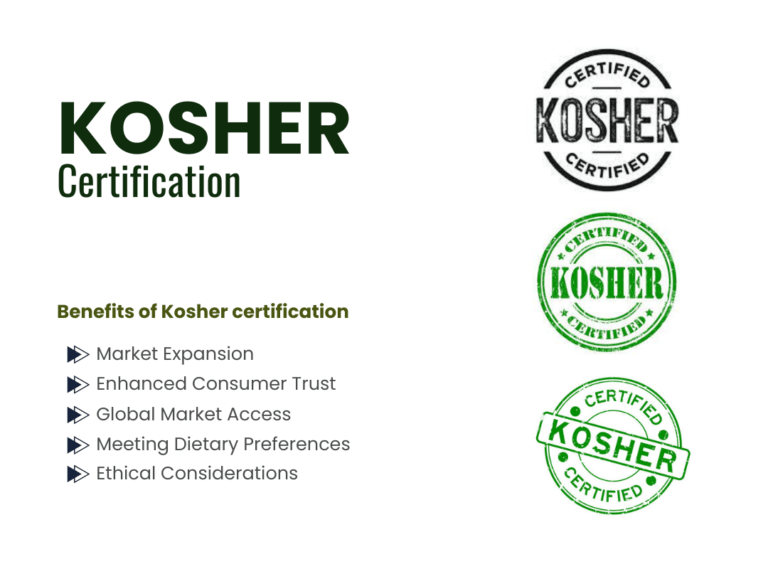Kosher Certification
- Home
- Kosher Certification
Understanding the concept of a Kosher Certificate is essential for those navigating the intricate dietary laws of Judaism. Kosher, derived from the Hebrew word ‘kasher,’ meaning ‘fit’ or ‘proper,’ refers to food that adheres to the strict dietary guidelines outlined in Jewish religious texts.
A Kosher Certificate serves as official documentation, affirming that a product or establishment meets these rigorous standards. From ingredients sourcing to processing methods, every aspect is scrutinized to ensure compliance with Jewish dietary laws. This certification not only caters to the religious requirements of observant Jews but also assures consumers of the product’s quality and integrity.

Benefits of Kosher Certificate
The following are the major benefits of the Kosher Certificate.
Market Expansion: Obtaining Kosher certification opens doors to a wider consumer base beyond the Jewish community. Many non-Jewish consumers seek out Kosher-certified products due to perceptions of quality, cleanliness, and adherence to strict standards. This broader appeal can significantly expand a product’s market reach.
Enhanced Consumer Trust: Kosher certification is often associated with rigorous inspection processes and adherence to strict standards of cleanliness and purity. This certification instills confidence in consumers regarding the quality and integrity of the product, leading to increased trust and brand loyalty.
Global Market Access: With the globalization of markets, Kosher certification can facilitate entry into international markets with significant Jewish populations, such as the United States, Israel, and parts of Europe. Having a Kosher certificate can eliminate barriers to entry and streamline the export process.
Meeting Dietary Preferences: Beyond religious observance, many consumers, including those with dietary restrictions or specific preferences, seek out Kosher-certified products. The certification provides assurance that the product meets certain dietary standards, such as being free from certain additives or ingredients.
Adherence to Stringent Standards: The process of obtaining Kosher certification involves thorough inspection and compliance with strict guidelines regarding ingredient sourcing, food preparation, and production facilities cleanliness. Adhering to these standards can improve overall quality control and food safety measures.
Ethical Considerations: For many consumers, purchasing Kosher-certified products aligns with their ethical values, as the certification often involves humane treatment of animals and fair labor practices. This alignment can appeal to socially conscious consumers, further enhancing the product’s marketability.
In conclusion, Kosher certification isn’t just about adhering to religious guidelines; it’s about building trust, expanding your market, and ensuring the highest quality for your customers. Whether you’re a seasoned manufacturer or a passionate entrepreneur, navigating the certification path can feel daunting. With the right guidance and resources, however, it can be a rewarding journey that unlocks new opportunities and solidifies your commitment to quality and tradition. Take the first step today and explore how Kosher certification can elevate your business and connect you with a wider community of discerning consumers.
